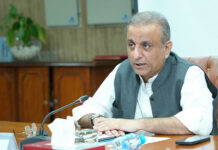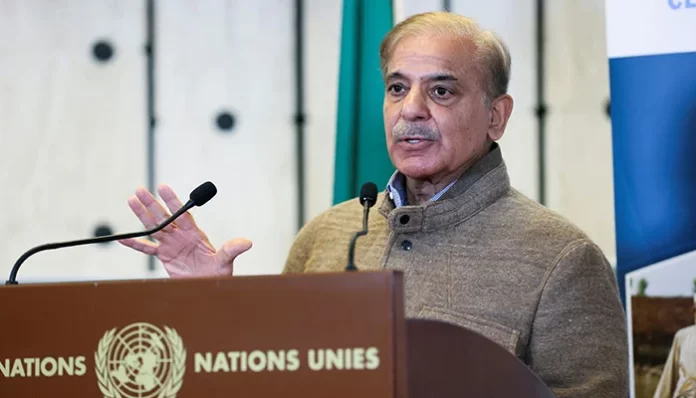More than $8 billion have been pledged to Pakistan by the international community at the International Conference on Climate Resilient Pakistan in Geneva. The moot had been planned and called after last year’s COP27 conference at which Pakistan was centre stage owing to last year’s super floods that left the country deeply devastated and struggling to finance the recovery effort.
The conference, which was co-hosted by the United Nations Secretary General Antonio Guterres and Prime Minister Shehbaz Sharif, was attended by heads of state, government representatives, and other stakeholders.
Background to the conference
Back in November last year, Pakistan had been front-and-centre at the COP27 conference. An annual conference on climate change held under the United Nations, last year’s COP had a particularly powerful story in the shape of Pakistan where floods had ravaged millions, destroyed crops, levelled entire villages, displaced 33 million people, and caused an estimated $40 billion in damages all over the country.
According to the Center for Global Development, developed countries are responsible for 79% of historical carbon emissions. Yet studies have shown that residents in least developed countries have 10 times more chances of being affected by these climate disasters than those in wealthy countries. Pakistan was hit with a major wave of climate-change related activity that resulted in death, destruction and total annihilation in some areas. The international media attention that followed allowed Pakistan the spotlight at this year’s COP, particularly with the PM being asked to co-chair the conference. UN Secretary General Antonio Guterres had also visited the flood affected areas earlier, and championed Pakistan’s cause at the conference.
While the COP27 conference had been focused on the larger issue of loss and damages for the developing world and climate reparations, there had been sideline discussions between the Pakistan delegation and representatives of other countries discussing the possibility of a donor conference some time in the future to collect funds to help Pakistan recover from the devastation caused by the floods.
How Geneva played out
The prime minister had gone into the conference in Geneva with the hopes of raising $8 billion. In his opening address at the conference, Shehbaz Sharif said that Pakistan needed $8bn from its international partners over the next three years to rebuild the country. Sponsored by France and Germany, the conference has come at a time when Pakistan’s economy is on the ropes with dollar reserves falling to record lows.
Flanked by Foreign Minister Bilawal Bhutto Zardari, Finance Minister Ishaq Dar, Minister for Climate Change Sherry Rehman and Minister for Information and Broadcasting Marriyum Aurangzeb the mood in the Pakistan camp was tense and there were worries over how close the moot would be able to get to the $8 billion point. However, the conference began to pick up pace with the European Union pledging $93 million, Germany $88 million, and China $100 million.
A major boost was given to Pakistan when the Islamic Development Bank, a multilateral development finance institution that is focused on Islamic finance for infrastructure development located in Jeddah, pledged $4.2 billion in support. According to one report, when the President of the bank Muhammad Al Jasser made the announcement, Prime Minister Shehbaz Sharif took the microphone out of turn to thank the bank and Jasser for the gesture.
In addition to this, the World Bank also pledged $2 billion, Japan $77 million, and the Asian Development Bank $1.5 billion. Saudi Arabia also made a major contribution with a pledge of $1 billion. Other pledges included $345 million from France and $100 million from USAid.
Pakistan ended up raising more than $9 billion, going beyond its target. The conference, of course, went beyond just the pledges. The first part of the conference featured high-level opening segments co-chaired by PM Sharif and Mr Guterres, with the official launch of the ‘Resilient Recovery, Rehabilitation, and Reconstruction Framework’ (4RF) which comprises institutional, financial and implementation arrangements for the post-flood recovery, besides international support to forge long-term partnerships to achieve climate resilience.
Implementational challenges
Much like the COP27 conference, the Geneva Moot has proven to be a pivotal success for Pakistan. With a significant amount pledged in funding, however, the next question is how Pakistan will be spending this. All in all, according to the latest report of the Post-Disaster Needs Assessment (PDNA), Pakistan needs at least $16.3 billion for post-flood rehabilitation and reconstruction. The PDNA report, released by the representatives of the government and the international development institutions, calculated the cost of floods at $30.1 billion – $14.9 billion in damages and $15.2 billion in losses.
Yet beyond this immediate need for reparations, Pakistan also needs a clear agenda on what it wants to do on the climate front. There is the immediate concern of rising temperatures, for example. According to Ali Sheikh, an expert on climate change and development, it is in the fundamental national security interest of Pakistan that global average temperatures stabilise at 1.5 degrees Celsius, since a change of 1°C has already caused serious disruptions and brought the economy to its knees. If no action is taken, Pakistan, like many other developing countries, will simply not have the residual resilience to cope with recurring climate disasters.
Pakistan faces a problem where even if it is given the climate financing that it is asking for, it will not know how to spend this money effectively. “It is not a question of financing but of governance. Just look at what you need to be spending money on. You need it for research and development. The losses that have been calculated are all infrastructural, but there is very little attention that has been paid to more long-term solutions. Losses in agriculture are becoming more and more severe and predictable for example but they continue to happen every single year,” explains climate expert Ali Sheikh.
“Even the mechanism we have to estimate loss and the response to it is very flawed. It is based on a top-down calculation instead of a bottom-up approach. In a top-down approach you think in dollars and in big terms, without consulting the real onground stakeholders such as farmers. Even the calculation of $30 billion in damages is infrastructural for the most part, and it has been calculated by institutions that think they will end up lending some of that amount. The UN Secretary General made a flash appeal based on the projects they were conducting in Pakistan for what they were doing. Each agency places themselves in the centre and makes that the centre of the issue. They are looking at their own business prospects, but the dilemma is that they have all the credibility. This is the kind of study that the government of Pakistan should have been doing. We cannot outsource thinking.”
Prime Minister and finance minister’s speeches
The premier recalled that Pakistan witnessed a “monsoon on steroids this year” that affected 30m people, displaced more than eight million and washed away roads spread over 8,000 kilometres. “One can go on and on but to truly say, we are racing against time. We are thankful for the support extended to us by the Asian Development Bank, UN, International Monetary Fund (IMF) and several other international organisations.”
He said that from the aid Pakistan received for flood rehabilitation, the state had “responded courageously” to the disaster. “They saved thousands of lives and quickly restored disrupted communications […] we will have to keep making tough choices and I am painfully aware that harsher reforms will make lives harsher than ever before,” he pointed out, contending that the “resource gap” was so wide that it had to be reshaped.
“The first part of the plan reflects the recovery and reconstruction, bearing in mind that the minimum funding of $16.3bn is required, half of which will be met with domestic resources, half from foreign resources.” I am asking for your support for those who have lost their life savings, homes, and livelihoods and are facing the harsh winter under open skies. I am asking for a sustained international support plan to meet this daunting challenge, for a new lifeline for these people. Together we have to rebuild their lives and their dreams.”
Meanwhile, finance minister Ishaq Dar said that Pakistan was facing unprecedented challenges. “The global community also has a unique opportunity – here and now – to chart a new course, to translate words into action and demonstrate the type of global solidarity the moment and our future demands.”
“Despite being responsible for only 0.67% of global emissions, Pakistan is the 8th-ranked country on the Global Climate Risk Index. It is time to step up support for long-term, systems-based approaches to recovery when disaster strikes. The Government of Pakistan is doing its part in reconstruction, but it will need financial and technical support to tackle the massive development challenges that lie ahead – from building systems for risk anticipation and resilience, to addressing the needs of internally displaced people, and broader threats to regional stability like climate migration.”
























